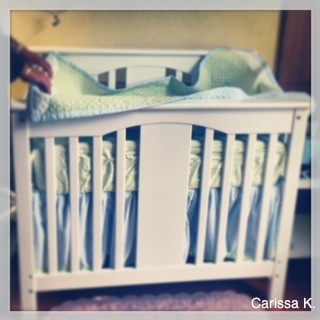Last week I was honored to sit on a parent panel discussing how we survived the emotional turmoil of a pregnancy after suffering an unexpected full term still birth. The workshop was called "The Effects of Perinatal Loss on Subsequent Pregnancies" and the audience was a group of medical professionals from around the Chicago area comprised of nurses, hospital chaplains, social workers and physicians all working in bereavement support.
About half way through the panel discussion something happened. Not only did I sort of hit my stride conversationally and feel myself steady as I settled into this difficult topic, but I realized that in this room and this setting, I was the expert. As the quiver in my voice evened, I processed the audience members. Few I knew, most I did not, but all I admired and respected. Yet, this prestigious community was looking to me and my fellow panelists for our expert opinions.
I wish I didn't have this expertise. Oh, so many times I've made this wish. Yet it's mine and it's one that I'm glad to use if doing so can help someone be better able to provide a bit of a peace to parents at a time when their world is falling apart. So I sat on this panel sharing my experience and owning my expertise.
I was a bit rattled during the discussion and understandably so. The workshop was taking place in the very hospital that holds some of the most tragic and sacred moments of our lives. It is also the professional home of some of the treasured people who helped us survive those moments. These are the moments that have shaped our family story and nurtured this expertise.
Last week I was seated at table in a conference room not far from the labor and delivery wing where we delivered our stillborn daughter seven years earlier. As I parked in the garage and walked towards the yellow elevator lobby I remembered exactly where we had parked on that day. Almost like muscle memory, my emotions were triggered by this physical space.
It is in this location where we attended monthly support group meetings diligently for 22 months through not only our grieving process but also our subsequent pregnancies. We have gone on memorial walks at this hospital and planted flowers in our children's honor in this hospital's roopftop garden.
Whenever we drive by this building our living children will point with delight and declare it as their sister's hospital. On sad days or holidays when I'm especially missing my daughter I jog by this hospital and intentionally take an extra beat under the wing where we delivered and spent time with her. Just recently a special room was dedicated and set aside for families who are in the process of saying goodbye to their dying or recently deceased baby. My husband and I donated a crib to this room after carefully choosing that specific model because it's name happened to be the same as our daughter's.
It's natural that for us to want to give back to this hospital, this organization and this cause. It's a space and place that means so much to us. Yet during last week's workshop I had to describe how I couldn't return to this beloved hospital to deliver our subsequent babies.
Some of my fellow panelists shared my perspective and need for a new setting. Some did not and felt most comfortable returning to the same hospital where they experienced their loss.
I thought I would until when just a few weeks into my subsequent pregnancy I had a spotting scare and went to the Emergency Room at that hospital. As I sat paralyzed with fear and grief for a baby I was certain I was about to lose, I heard a name over the PA system It was the name of the doctor who had the unfortunate role of informing me that my baby's heartbeat had stopped during my last pregnancy. I thought highly of that doctor, but hearing her name in that space, triggered an emotional muscle memory and I knew I wouldn't be back as a patient.
I told this story last week during the workshop. My fellow panelists each had their own story to describe what the physical space meant to them. Just as each of our children is unique, each of our losses are unique. Yet we all share the universal heartbreak of grieving a child we never had the chance to get to know.
Because of this bond that we share, a few key themes presented themselves as our discussion unfolded. I want to capture those here so that other medical professionals might keep them in mind if they have patients who have suffered perinatal loss and are going through a subsequent pregnancy. In fact, these are probably good things to note for anyone who is providing friendship and support to someone who is grieving the loss of a baby.
Use the term "child" not "pregnancy."
Sure, from a medical and clinical standpoint, our experience is considered a pregnancy. But to us and our hearts this baby is a person, not an event. We are deeply grieving the child's life who either ended inside of us right before they were born, or shortly after they were born. At a minimum we've spent the last nine months already parenting our child, making sacrifices and plans, eagerly reading books and preparing nurseries. But often times we've spent years awaiting the arrival of our child. Even as long ago as I was child and old enough to imagine myself as a mother I was already thinking about and planning for the baby I assumed I would have one day. So in that way, we are also deeply grieving the loss of a dream. The point being that to us this is so much more than a pregnancy and we appreciate you acknowledging that.
Review our file first.
This whole process is exhausting and it's extra draining every time we have to repeat our story. It would be wonderful if every one we encountered from a medical perspective during our subsequent pregnancy was aware of our history prior to meeting with us. From the physicians to the nurses, to the ultra sound technicians there is a lot of small talk during pregnancy appointments and that's friendly and fine. But please know the enormous tension we are feeling while we're hooked up to an ultra sound machine or doppler device desperately waiting to hear a baby's heartbeat. We are probably analyzing your tone and facial expressions looking for clues that everything is ok. It is taking every last ounce of our energy to just be here, doing this.
It is excruciating.
Period. Even with a thesaurus, I can't find the right word. There isn't one. Agonizing, grueling, tormenting, excruciating. No one of these words do this process justice.
We need reassurance.
My husband and I made multiple trips to the hospital during the third trimester of our subsequent pregnancies because we were worried about a lack of fetal movement. Often times we spent hours overnight hooked up to a monitor or ultra sound machine. There were so many phone calls and extra appointments. We spent the night before one of our daughters was scheduled to be delivered in a hotel room across the street from the hospital. We were too worried to be further away. When our next daughter was born we spent the night before her birth in the hospital triage area worried about a lack of fetal movement. We were discharged at 5:00 a.m., drove home and then returned five hours later at 10:00 a.m. for her scheduled delivery. Right up until we hear that baby's cry we are terrified and in need of doctors who will allow us all of the reassurance visits and phone calls we need.
The best thing you can ask us is "how are you doing today?"
My husband helped identify this mantra during our subsequent pregnancies: "Today we are pregnant, and today it is going well." That is all we allowed ourselves to celebrate... today. And frankly, as we had sadly learned in the past, that was all we were guaranteed. Our moods change daily, if not hourly, during this process. Sometimes optimistic and upbeat, sometimes sorrowful and grieving and sometimes nervous and distracted. The best thing you can do is help us focus on that moment, that day and don't push us into a space, either in the future, or past, that we aren't prepared to be in right then.
When possible, use our child's name.
As I said before, we spent nine months, and sometimes longer, parenting our child. But we will never be able to go to her soccer games or his school conferences. We'll never build the science fair volcano together or give our child birthday parties. We can't teach him the ABC's or meet her college roommates. There are so many things we'll never get to do with our daughter or son. But one of the few gifts we were able to give to our child is a name. We are proud of our child's name and since it is one of the only things that we can cling to as proof of his or her existence, we love hearing it.
All of that being said, of course there's no one playbook on how to grieve, just as there's no one playbook on how to help someone through this process. But as the parent panel portion of the workshop came to a close last week, the members of the medical community clapped, and cried and stopped to give us hugs or tell us how much they appreciated our insights. I was touched by how badly they wanted to know the right answer and right thing to do. And I was reminded that wanted or not, this is now my expertise. And just as the medical community guided me through the darkest of my days, I can help them guide others back to the light.
This post originally appeared on Carissa's blog, www.carissak.com. You can see more from Carissa by following her on Tumblr, carissakwriter.tumblr.com, Facebook at www.facebook.com/carissaKwriter, Twitter @CarissaK or Instagram, www.instagram.com/carissakwriter. Thanks for reading.

